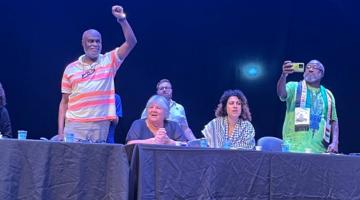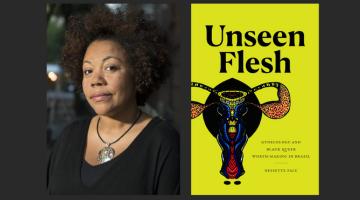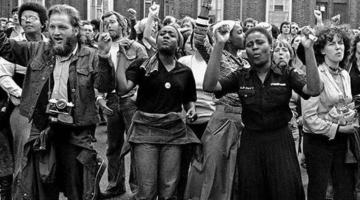“The Brazilian state is conducting an even more lethal war against its Black population than its northern counterpart’s militarized oppression of U.S. Blacks.”
The assassination of Rio de Janeiro city councilwoman Marielle Franco sent huge crowds of outraged mourners into the streets of Brazil, the western hemisphere’s “blackest” nation, where more than half of the 210 million inhabitants describe themselves as preto (black) or pardo (partly African). The 38 year-old member of the Party of Socialism and Liberty (PSOL) and her driver were ambushed by hit men firing police-issued bullets, sending “a message to all black bodies that fight for rights in the favela,” the besieged ghettos of Brazil’s cities, said Black activist Marcelle Decothé.
Shaun King, writing in The Intercept, described Franco as, “for all intents and purposes, a leader of the country’s parallel to the Black Lives Matter movement in the U.S.”
In this week’s issue of Black Agenda Report, Black Brazilian journalist and anthropologist Jaime A. Alves describes Franco, a lesbian with a 19 year-old daughter, as “fearlessly vocal against police terror. Days before her killing,” Alves writes, “she denounced on twitter the disappearance of two youth kidnapped by the police in the neighboring favela of Acari. She was also leading the human rights commission to monitor police and military abuse during the military intervention decreed by president Michel Temer.”
“Franco was fearlessly vocal against police terror.”
The Brazilian military ruled with an iron hand -- and U.S. backing -- from 1964 to 1985. The Temer regime remains hugely unpopular more than two years after the “legislative coup” that unseated the Workers Party government of Dilma Rousseff, throwing the nation into political turmoil. Some fear President Temer’s handover of policing in Rio to the generals amounts to a creeping military coup. "I believe that this is one more step along the road of being able to restore security, order and, above all, confidence to residents of Rio de Janeiro state," said top Temer advisor Wellington Moreira Franco. "This spirit is being mobilized so that ... this methodology can spread throughout Brazil."
It is almost immaterial whether Marielle Franco was killed by the military or civilian police, or other henchmen; she was cut down by a white supremacist Brazilian state that is even more lethally racist than its counterpart in the northern hemisphere. Her death is an occasion for serious examination of the similarities and differences in the Black condition in Brazil and the United States, especially regarding police.
BAR contributor Jaime Alves believes the transfer of police duties to the military is a “test case for Brazil as a whole.” But, he emphasizes, for Black activists, the favelas have always been under occupation. “Despite the regime of citizenship, decolonization is still to be completed” in the last major country in the world to abolish slavery, in 1888.
“The favelas have always been under occupation.”
According to the official numbers, Brazil’s police kill 4, 224 civilians a year. Alves asks us to “imagine a country where twelve civilians are ‘legally’ killed by the police on a daily basis.” Seventy-six percent of the dead are Black, meaning nine Black men or boys are killed by Brazilian police every day (99 percent are male). Alves notes that these statistics “do not count the ‘disappeared’ and ‘unknown’ that have turned poor and predominantly black urban communities in Brazil into macabre geographies.”
In the United States, cops killed 1,129 people in 2017, according to a Mapping Police Violence study, 305 of them Black people. That amounts to one Black person killed by cops every 29 hours -- less than one a day.
Brazil’s Black population is over 100 million, two and a half times the U.S. Black population of 40 million. If the Black USA were as large as Black Brazil, the rate of cop killings of Blacks would be one every 11 and a half hours, or a little more than two deaths per day – still far below the Black Brazilian daily death toll of nine, but horrific on any national scale other than that which is weighted down by centuries of slavery, the organized mass grinding up and murder of entire peoples. Black lives in both Brazil and the U.S. are terminated by the state on a low-intensity warfare scale.
“Imagine a country where twelve civilians are ‘legally’ killed by the police on a daily basis.”
Clearly, the Brazilian state is conducting an even more lethal war against its Black population than its northern counterpart’s militarized oppression of U.S. Blacks. There is plenty of room for debate on why this is so, but I submit that the historical militancy and relative solidarity of Blacks in the U.S. has been a great shield and spear against an unrelentingly hostile white society and state. Although Blacks in the U.S. constantly complain of a lack of solidarity and waning militancy among our people, the truth is that, compared to other populations of the African diaspora, we are collectively fierce! That’s why Shaun King speaks of Marielle Franco as, “for all intents and purposes, a leader of the country’s parallel to the Black Lives Matter movement in the U.S.” – and not the other way around. There are Black Panther Party “parallels” in India -- and, as we note in this issue of BAR, in Puerto Rico -- and Black Americans are the model of Black militancy in most of the world. No other Black national group has waged repeated urban rebellions in the major cities of a modern, white-led capitalist state. The resilience of Black U.S. solidarity and militancy means there are political, economic and, sometimes, blood prices to be paid for crimes against this people – and the state knows it.
“The historical militancy and relative solidarity of Blacks in the U.S. has been a great shield and spear against an unrelentingly hostile white society and state.”
A key factor that distinguishes Black people in the U.S. from others in the diaspora is the historical absence of an independent mulatto class. The relatively high prices brought by the heavily securitized and fantastically profitable slave “stock” in the U.S. discouraged slaveholders from allowing the creation of such a class, while constantly reinforced white majorities eliminated the need to formalize a “buffer” population of mixed race persons in the United States. The slave descendants here are uniformly “Black” -- and consciously so. Our super-exploitation -- with no means to escape by “lightening” the race – was transformed into a near-unique level of solidarity.
Black Brazil is belatedly transforming, too – as is dramatically evident in the census numbers, themselves. There are many more “self-declared black” people -- as Alves describes Marielle Franco -- in Brazil than ever before, despite long periods of massive European immigration to that country, thanks to a Black movement largely inspired by its brothers and sisters in the United States.
All power to the people of the favelas! Love Live Marielle Franco!
BAR executive editor Glen Ford can be contacted at Glen.Ford@BlackAgendaReport.com



















